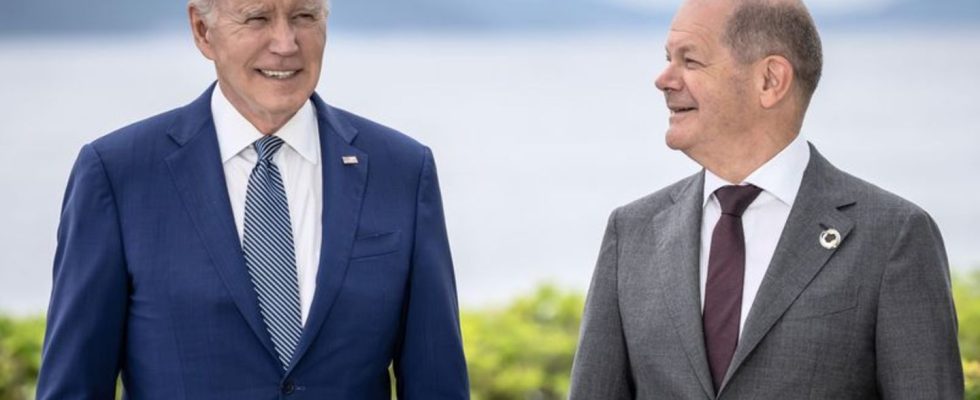Government
Wars, crises and Trump: Scholz travels to the USA
US President Joe Biden (l) and Federal Chancellor Olaf Scholz want to meet in Washington on Friday. photo
© Michael Kappeler/dpa
The war in Ukraine, the crisis in the Middle East and the NATO summit: these are the topics that are officially on the agenda of the Chancellor’s visit to Washington. But there is something else.
A dinner with parliamentarians, a breakfast with entrepreneurs and, as a highlight, a one-on-one conversation with US President Joe Biden in the White House: the third visit by the Chancellor Olaf Scholz’s visit to Washington this morning will last almost exactly 24 hours. It’s all about this:
Ukraine aid: signal for continued military aid
The trip comes just days before the second anniversary of Russia’s invasion of Ukraine on February 24, 2022. If there is one message that is particularly important to the Chancellor during his visit to Washington, it is that of continued solidarity with Ukraine. Russian President Vladimir Putin is just waiting for Western allies to tire of military aid, the SPD politician said at the beginning of the week. “And that is the message that must be clearly sent to him from both the USA and Europe: This calculation does not work. We will support Ukraine.”
The USA is by far Ukraine’s most important arms supplier. Germany is number two and by far the largest donor country in the EU. However, both Biden and Scholz have different problems when it comes to mobilizing further aid. Scholz has been urging EU partners to significantly increase their support since the beginning of the year. The appeal is aimed primarily at economically strong countries such as France, Spain and Italy, but has so far received only a moderate response.
Biden, in turn, is faced with a tough blockade in Congress that is preventing further aid from the US from flowing to Ukraine. The president had requested new money for Kiev from Parliament months ago, but Republicans expressed doubts about further support for Ukraine and also demanded significantly more resources to secure the US border. The domestic political dispute drags on with no solution in sight. The funds approved so far have now largely been used up, and all of the president’s appeals about how much Kiev is dependent on US aid have so far come to nothing.
Middle East: Gaza War, Red Sea and Iran
Almost at the same time as the Chancellor’s departure for Washington, the Bundeswehr frigate “Hessen” sets sail from Wilhelmshaven to help protect merchant ships in the Red Sea against attacks by the Iran-backed Houthi militia. The Chancellor’s conversation with Biden will be about this mission, as well as the risk of a conflagration in the Middle East as a whole. Fear of this has recently increased significantly due to the drone and missile attacks on US positions in the region and the American counterattacks on pro-Iranian militias.
Biden has a difficult balancing act to manage: He must deter the Tehran-backed forces in the region without provoking even harsher reactions. He needs to show strength without completely escalating the situation in the Middle East and risking war with Iran. It remains to be seen how Iran and its allied militias will react to the latest US air strikes. The only thing that is clear so far is that further military action will come from the American side.
During their conversation, Scholz and Biden are also likely to look to the future: What will happen next for Israel and the Palestinians after the Gaza war? Both support a two-state solution. But which path could lead there is anyone’s guess.
NATO: Preparation for the anniversary summit
Scholz’s next trip to Washington is already planned. In July, the Chancellor will return to the US capital for the NATO anniversary summit. The alliance is 75 years old and wants to ensure its defense readiness for the future. Scholz wants to appear confident: For the first time in more than 30 years, Germany wants to spend more than two percent of its economic power on defense this year. In addition, the combat brigade in Lithuania that Defense Minister Boris Pistorius (SPD) is currently setting up and the European missile shield initiated by Germany are considered flagship projects in NATO.
The fact that the military alliance is celebrating its anniversary in the American capital just four months before the next US presidential election is not without a certain amount of drama. Because so far everything indicates that the former Republican US President Donald Trump is likely to challenge the incumbent Biden in the election. And this same Donald Trump questioned the future of the entire NATO during his term in office.
Trump: The elephant in the room
His possible return to power is a topic that is not on the official agenda for the trip, but will still accompany Scholz: What if Donald Trump actually moves back into the White House after the election on November 5th? The Chancellor will not meet Trump himself. That wasn’t even considered. But Scholz will try to get an idea of the mood in Trump’s party at a dinner with members of Congress. Republican representatives as well as members of Biden’s Democratic Party are invited to the meal.
Even if the primary election campaign in the USA is not over, Biden’s campaign team is already preparing for Trump to become the Republican presidential candidate. Biden warns about his expected challenger wherever he can – and about what would happen to the country and the world in a second Trump term. However, the popularity ratings of the oldest president of all time are not very encouraging, and polls predict a close race between Biden and Trump – if it comes to that.

